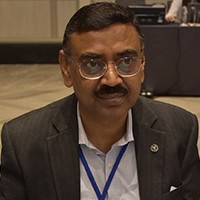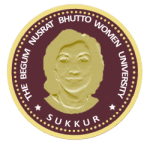
Dr. Bhawani S. Chowdhry
Biography
Renowned Scientist and ICT expert, Prof. Dr. BS Chowdhry is an Emeritus Professor and former Dean, Faculty of Electrical, Electronics, & Computer Engineering, Mehran University of Engineering & Technology (MUET) Jamshoro. In 2017 he received status of Distinguished National Professor. He has varied experience in diversified fields such as Electronics, Telecommunication, Microprocessor Technology, Internet of Things, Telemedicine, Wireless sensor networks, conditioning monitoring etc. After completing his first degree in the Electronic engineering discipline in 1983, he did Ph.D. in the field of Microprocessor-Based Intelligent Instrumentation from the school of Electronics and Computer Science University of Southampton, UK in 1990.
He supervised/co-supervised more than dozen PhD’s and more than 50 MPhil/Master’s Thesis in the area of ICT. His list of research publications crosses over 60 in national and international journals, IEEE and ACM proceedings. He has also had the credit of becoming one of the editor of books “Wireless Networks, Information Processing and Systems”, CCIS 20, and “Emerging Trends and Applications in Information Communication Technologies”, CCIS 281, and “Wireless Sensor Networks for Developing Countries”, CCIS 366 published by Springer Verlag, Germany in addition to more than dozen books published nationally. He is recipient of Higher Education Commission (HEC) University Best Teacher Award 2001 (Awarded by Federal Minister of Education) and National Cultural Award-2002 in recognition of achievements in the field of Engineering Profession (Awarded by Federal Minister of Culture, Tourism, Minorities Affairs, 23 Sep 2002) and Presidential Highest Academic Distinction Award (Izaz-e-Fazeelat) in 2009.
He is also actively serving national and international professional and scientific bodies in various capacities including Chairman IEEE Communication Society (COMSOC), Karachi Chapter, Region10 Asia/Pacific, Fellow IEP, Senior Member, Institute of Electrical & Electronic Engineers Inc. (USA), SENIOR Member, Association of Computer Machinery (ACM), USA, Member IEEE Industrial Electrical Society, Member IEEE Communication Society, Member IEEE Society on Social Implications of Technology, Member IEEE Education Society, Member IEEE Instrumentation & Measurement Society, Member, The International Society for Telemedicine & e-Health (ISfTeH), Switzerland, Member, World Federation of Engineering Organization (WFEO), France, Member, International Association of Engineers (IAENG), Member Engineering Accreditation Committee PEC, Member Governing Body PEC (2012- 2014), Expert reviewer ICTR&D, and various HEC reviewers/experts Committees, Honorary Consulting Editor “Engineering Review” and “Wire and Wireless” Magazine. He has organized many international conferences in Pakistan including IMTIC08, IEEE SCONEST, IMTIC12, IEEE PSGWC 13, WSN4DC13and IMTIC13, IMTIC15, IMTIC’18, and proceedings of these
conferences have been published by Springer Germany. Also, he was trusted with responsibilities of Lead person for four European Commission Erasmus Mundus exchange programs “Mobility for Life”, “STRoNG-TiES” (Strengthening Training and Research through Networking and Globalisation of Teaching in Engineering Studies), INTACT (It’s Time for CollaboratioNTowArds Close CooperaTion) and LEADERS (Leading mobility between Europe and Asia in Developing Engineering educations and ReSearch).
Abstract
Taking the lead for effectiveness of virtual assessment tools in covid’19 excellence
Coronavirus disease 2019 (COVID-19) pandemic has pushed distance learning to new heights, presenting unprecedented challenges such as effective utilisation of Learning Management System (LMS) along with availability of good Internet access. Virtual assessment tools such as Moodle, Microsoft / Google Forms, Kahoot, Nearpod, Flipgrid have replaced the traditional ways of pen and paper-based assessments. Careful selection of an appropriate virtual assessment tool is important to not overwhelm students/teachers to learn all available virtual assessment tools. Short quick questions during and after a lecture have found to be effective means of assessment in a virtual classroom. Microsoft Teams Breakout Rooms where classmates in a group discuss their reflections of what they have learned and share back to the class to close out the learning are new ways to improve learning and assessment process in the virtual classroom. This presentation will focus on effectiveness of virtual assessment tools in covid’19 excellence in eLearning environment.
